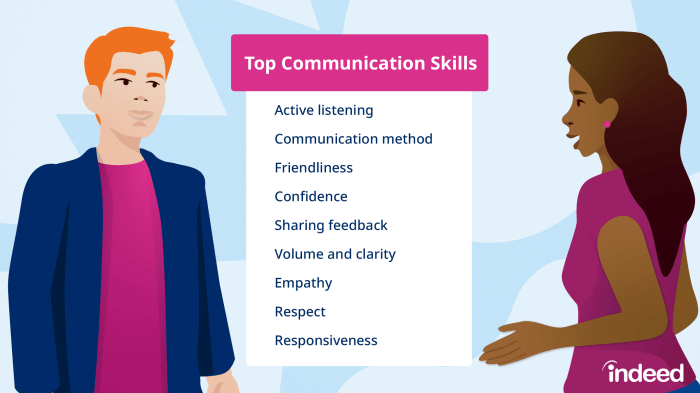Effective Communication Skills set the stage for success, whether you’re navigating personal relationships or climbing the professional ladder. From decoding non-verbal cues to crafting compelling messages, this essential skill set is your key to unlocking endless possibilities.
In this guide, we’ll delve into the core components of effective communication and equip you with strategies to enhance your interactions on all fronts.
Importance of Effective Communication Skills

Effective communication skills are essential in both personal and professional settings as they play a crucial role in building relationships, resolving conflicts, and achieving success. Whether it’s expressing your thoughts clearly, active listening, or conveying information effectively, strong communication skills are key to fostering understanding and collaboration.
Real-life Impact of Effective Communication Skills
In a professional setting, effective communication skills can lead to increased productivity, better teamwork, and improved customer relations. For example, a salesperson who can communicate persuasively is more likely to close deals and build long-term client relationships. In personal relationships, effective communication can prevent misunderstandings, strengthen bonds, and resolve conflicts before they escalate.
Consequences of Lack of Communication Skills
On the flip side, the lack of communication skills can result in misunderstandings, conflicts, and missed opportunities. For instance, a manager who fails to communicate clearly with their team may experience low morale, decreased efficiency, and ultimately, high turnover rates. In personal relationships, poor communication can lead to trust issues, resentment, and ultimately, the breakdown of relationships.
Key Elements of Effective Communication

Effective communication involves several key elements that are essential for conveying messages clearly and accurately. These elements play a crucial role in ensuring that information is understood and interpreted correctly by the recipient.
Active Listening, Effective Communication Skills
Active listening is a fundamental element of effective communication. It involves fully concentrating on what is being said, understanding the message, and responding thoughtfully. By actively listening, you demonstrate respect for the speaker and show that their thoughts and opinions are valued. This not only helps in building trust and rapport but also ensures that communication is more meaningful and productive.
Non-Verbal Communication Cues
Non-verbal communication cues, such as facial expressions, gestures, posture, and tone of voice, play a significant role in conveying messages accurately. In fact, research suggests that non-verbal cues can make up a substantial portion of communication, sometimes even more than verbal content. Paying attention to these cues can help you better understand the emotions, intentions, and attitudes behind the words spoken, leading to a more comprehensive interpretation of the message being communicated.
Strategies to Improve Communication Skills: Effective Communication Skills
Improving communication skills is essential for success in both personal and professional settings. Here are some practical tips to enhance your verbal and written communication skills:
Verbal Communication Skills
- Practice active listening: Focus on what the speaker is saying without interrupting.
- Use clear and concise language: Avoid jargon and unnecessary details to ensure your message is easily understood.
- Work on your nonverbal cues: Pay attention to your body language and facial expressions to convey confidence and interest.
- Engage in group discussions: Participate in conversations to improve your communication in a group setting.
Written Communication Skills
- Organize your thoughts: Structure your writing with an introduction, body, and conclusion for better clarity.
- Proofread your work: Check for spelling and grammatical errors to ensure your message is conveyed accurately.
- Use appropriate tone and language: Tailor your writing style to suit the audience and purpose of your communication.
- Practice writing regularly: Whether it’s through emails, reports, or social media posts, consistent practice can help improve your written communication skills.
Exercises and Activities
- Role-playing scenarios: Act out different communication situations to practice responding effectively.
- Public speaking practice: Presenting in front of a mirror or recording yourself can help build confidence in speaking skills.
- Join a debate club or toastmasters group: Participating in structured communication activities can enhance both verbal and written skills.
- Peer feedback sessions: Exchange feedback with friends or colleagues to receive constructive criticism and improve your communication skills.
Overcoming Communication Barriers
Effective communication can often be hindered by various barriers that prevent the message from being delivered or understood correctly. It is crucial to identify these barriers and implement strategies to overcome them in order to ensure clear and successful communication.
Common Barriers to Effective Communication and Ways to Overcome Them
- Physical barriers such as noise, poor lighting, or distance can disrupt communication. To overcome these, ensure a quiet environment, adequate lighting, and reduce physical barriers between communicators.
- Emotional barriers like stress, anxiety, or biases can also impede communication. It is important to practice active listening, empathy, and create a safe space for open dialogue to overcome emotional barriers.
- Language barriers can arise due to differences in vocabulary, accents, or fluency. To overcome these, use simple language, clarify meanings, and be patient when communicating with individuals who speak a different language.
Cultural Differences Impact on Communication and Strategies to Bridge the Gap
- Cultural differences can lead to misunderstandings, misinterpretations, or offense during communication. To bridge this gap, educate yourself on different cultures, customs, and communication styles, and adapt your communication approach accordingly.
- Respect diversity, be open-minded, and avoid making assumptions based on cultural stereotypes. Embrace differences and seek common ground to enhance cross-cultural communication effectiveness.
Techniques to Handle Difficult Conversations and Conflicts through Effective Communication
- Practice active listening, remain calm, and avoid defensive behaviors during difficult conversations. Acknowledge emotions, validate concerns, and work towards finding mutually acceptable solutions.
- Use “I” statements to express feelings and perspectives without blaming others. Focus on the issue at hand, ask clarifying questions, and seek to understand different viewpoints to resolve conflicts effectively.
- Seek feedback, clarify expectations, and establish clear communication channels to prevent misunderstandings and conflicts from escalating. Address issues promptly, openly, and respectfully to maintain healthy relationships and effective communication.
